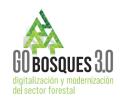
Operational Group: Digital Shepherds Against Fire - Digital Pyric Silvopastoralism and Commercial Valuation
- Type Operational group
- Status In progress
- Execution 2024 -2025
- Assigned Budget 160.226,00 €
- Scope Autonómico
- Autonomous community Andalucía
- Project website GO SILVOPASTORISMO
The Operational Group (OG) project focuses on the digitalization of extensive grazing in Andalusia, with the aim of addressing the current challenges of the livestock sector, especially in forested areas and natural parks. Through digitalization, the project seeks to improve fire prevention through pyric silvopastoralism, where controlled grazing of goats and sheep is used as a tool for forest biomass management and fire risk reduction.
One of the main expected outcomes is the creation of a pilot project in the Sierra de Segura region, where technology will be used to digitally identify, map, and manage grazing areas. IoT sensors, satellite images, and advanced technologies such as artificial intelligence and digital twins will be used to monitor and control grazing activities. In addition, a digital traceability system will be developed to ensure the quality of livestock products, differentiating them from industrial livestock, which could increase their market value.
The use of blockchain technology will also allow for the validation of meat product certification, improving its transparency and authenticity. This comprehensive approach seeks to dignify the pastoral profession, fostering new vocations and ensuring generational continuity in the sector.
The digitalization of grazing offers multiple practical benefits for livestock farmers and end users. First, it allows for optimized production costs through remote livestock monitoring and the automation of key processes, such as identifying high-risk fire zones. This not only increases efficiency but also improves response capacity to potential emergencies.
Another key advantage is the positive impact on territorial governance. Integrating pastoralists and civil society actors into silvopastoral planning allows for more inclusive and collaborative decision-making, ensuring that local needs are effectively addressed. This can facilitate access to fair payment schemes for the environmental services pastoralists provide, recognizing their crucial role in fire prevention. Furthermore, digitalization helps enhance the value of the final product.
Digital livestock traceability allows producers to differentiate their meat in the market, highlighting attributes such as animal welfare and sustainability. This not only contributes to improved competitiveness but also strengthens the relationship between consumer and producer, facilitating the creation of short distribution channels that benefit both parties.
The Operational Group (OG) project focuses on the digitalization of extensive grazing in Andalusia, with the aim of addressing the current challenges of the livestock sector, especially in forested areas and natural parks. Through digitalization, the project seeks to improve fire prevention through pyric silvopastoralism, where controlled grazing of goats and sheep is used as a tool for forest biomass management and fire risk reduction.
The main pillars of the Governing Body will be the following: Identification and zoning of the ZAR zones based on aerospace technology and historical background; Optimization of grazing costs through digitalization for "paid grazing"; Digital traceability of grazing; and commercial valorization of extensive meat products.
The project seeks to revitalize rural Andalusia by digitalizing pyric silvopastoralism, developing a sustainable livestock sector that is key to fire prevention. It also promotes the generational renewal of shepherds, dignifying their profession and improving profitability with optimized costs and a fair remuneration system.
Pyric herbivory is considered an essential tool in sustainable forest management and fire prevention, relying on existing programs and the digitalization of the activity.
One of the main expected outcomes is the creation of a pilot project in the Sierra de Segura region, where technology will be used to digitally identify, map, and manage grazing areas.
IoT sensors, satellite images, and advanced technologies such as artificial intelligence and digital twins will be used to monitor and control grazing activities. In addition, a digital traceability system will be developed to ensure the quality of livestock products, differentiating them from industrial livestock, which could increase their market value.
- Coordinator/entity name: GRUPO CONSULE SL
- Postal address: Ring Road 44, Bajo- 23300 Villacarrillo, Jaén
- Coordinator/entity email: grupoconsule@grupoconsule.es
- Telephone: 953637093
- GRUPO CONSULE S.L.
- Universidad de Jaén (otri@ujaen.es)
- FRANCISCO JOSÉ CASTILLO MARTÍNEZ Y DOS MAS O.E.S.P.J. (castillomartinezhermanos@gmail.com)
- Fundación Pública “Hub de Innovación Territorial del Común de Segura” (juanfranciscofl@gmail.com)
- GRUPO CONSULE S.L.
- News
- News
- News
- News
- News
- News
- News
- Post from the Operational Group in X
- Post by the Operational Group on LinkedIn
- Silvopastoralism Objectives
- Mission and Members Silvopastoralism
- Silvopastoralism Publications
- Silvopastoralism Results
- Silvopastolarism Gallery
- Post Silvopastoralism Digital Content
- Digital Content Podcasts Silvopastoralism
- Digital Content Videos Silvopastoralism
- Contact Silvopastoralism







